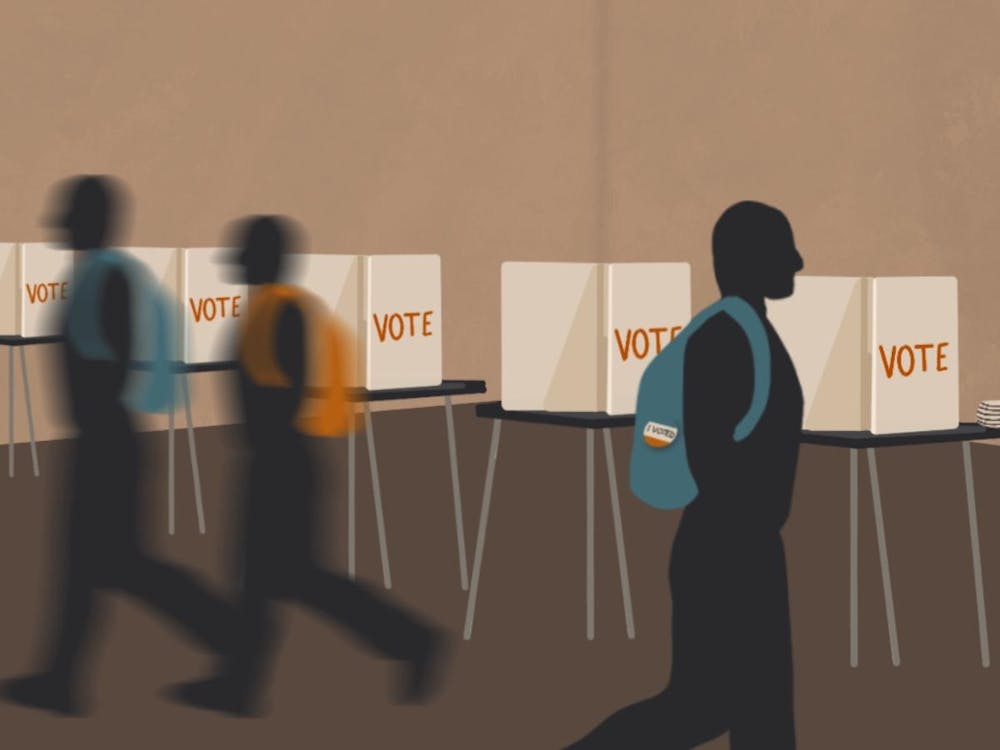Vision and Change Parties — student-run political parties — have begun posting campaign videos on Instagram while finding new candidates to run for UF Student Government Senate. In three weeks, ballot boxes will open from Oct. 8 to Oct. 9.
Despite the power SG wields, including holding a voice on UF’s Board of Trustees and distributing $23 million of university funds, voter turnout has remained historically low.
Since 2000, UF student voter turnout averaged 14% and hit highs in 2008 and 2023 with 20%.
Samantha Perez, a 19-year-old UF environmental engineering sophomore, said her understanding of SG’s reach on campus has remained limited. She assumes it serves as a soundboard for students to communicate their perspectives, wants and needs with administration and faculty. But even that kind of presence has been lacking, she said.
“I haven’t heard Student Government mentioned at all,” she said. “I don’t know if they’ve been tabling, but at least I haven’t been there when they’ve been tabling.”
SG stood at the center of several hot button issues over the past two semesters, including the consolidation of off-campus districts into a single super-district, changes to Marston Science Library’s operating hours and the creation of new SG agencies.
Student political parties are limited to campaigning only in the three weeks leading up to the election, during which they regain access to campaign social media accounts and become highly active. SG as an organization faces no such limitations on sharing information about itself and often posts on its own social media throughout the year.
After understanding the breadth of SG’s financial impact on campus, especially with regard to club funding, Perez said she is inclined to pay more attention to elections.
Gavin Palasigue, a 20-year-old UF pre-nursing sophomore, said he views SG as a crowd of canvassers who appear in areas like Turlington and the Reitz Student Union North Lawn before disappearing until the next short-lived election season.
When canvassers do approach him, he shrugs them off to focus on making it to class on time.
“I would love to pay more attention, but at the same time, it’s Student Government,” he said, describing the governing body as “nebulous” and lacking connection with students.
What little he said he heard about SG came from a friend who serves as a Vision senator.
Jose Rondon, a 20-year-old UF economics sophomore, echoed similar sentiments.
Rondon said he knew “very little” about SG, its elections and its candidates.
“Maybe if I learned more about it, I’d be more interested in it, and I would care more for the candidates,” he said. “Since I don’t know that much about it, it’s not even in my mind.”
Rondon, however, didn’t say he was opposed to paying attention to SG, but that it needs to “communicate what impact it is they make on the general student population.”
Once Rondon heard that SG Senate is responsible for funding student organizations, he expressed heightened concern about SG in general, especially as a member of the University Economics Society.
“Just knowing that, I feel like I would care more for all the clubs that are funded by Student Government, especially the ones I’m in,” he said.
While the majority of UF students remain apathetic to casting votes, a few have paid closer attention to the biannual election cycle.
One of those students, Kangjin Wong, a 20-year-old UF psychology behavioral and cognitive neuroscience junior, said he came to UF expecting SG to fill a similar role as it did at his high school.
When Wong discovered SG Senate allocates millions of dollars of tuition money every year, he realized the structure was vastly different from a high school Student Government Association.
“What are they going to do with that tuition and, by extension, my money?” he said.
Wong said issues like the new election map motivate him to vote out of frustration and dissatisfaction with the ruling party, especially as an off-campus student. Many students who live off campus are also members of minority groups and foreign students who seek off-campus housing due to money constraints, Wong added.
“By drowning out those voices with fraternities and sororities, it’s racism,” Wong said. “You don’t give [minority students] a choice of what to do with their 23 million dollar budget.”
Having done his own research into SG, Wong doesn’t entirely blame poor education for low SG election turnout, he said.
“People just don’t care,” he said. “They don’t think it affects them that much.”
Wong said he supports SG handing out flyers, hanging up posters and tabling across campus. But an email list would be especially helpful in informing students, he added, similar to how various UF colleges inform students about opportunities through mass emails.
Raj Mia, a 22-year-old UF food and resource economics senior and former Change senator, said, in his experience, controversy draws students to the polls more than anything else.
Mia said he expects the new election map to fuel some of that motivation while instilling a sense of hopelessness among off-campus voters.
“Having an at-large map adds exhaustion and defeat to some people,” he said.
He predicted no more than 14,000 students would vote, which would mean 25% turnout at most.
Contact Avery Parker at aparker@alligator.org. Follow him on X @AveryParke98398.
Avery Parker is an English and history senior and the Summer 2025 University Editor. When he's not buried in thesis research, he enjoys exploring rivers and listening to The Wrecks.






